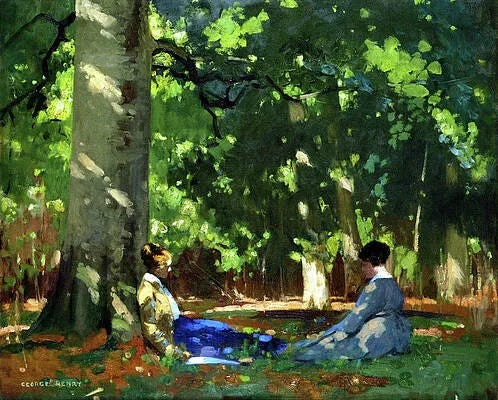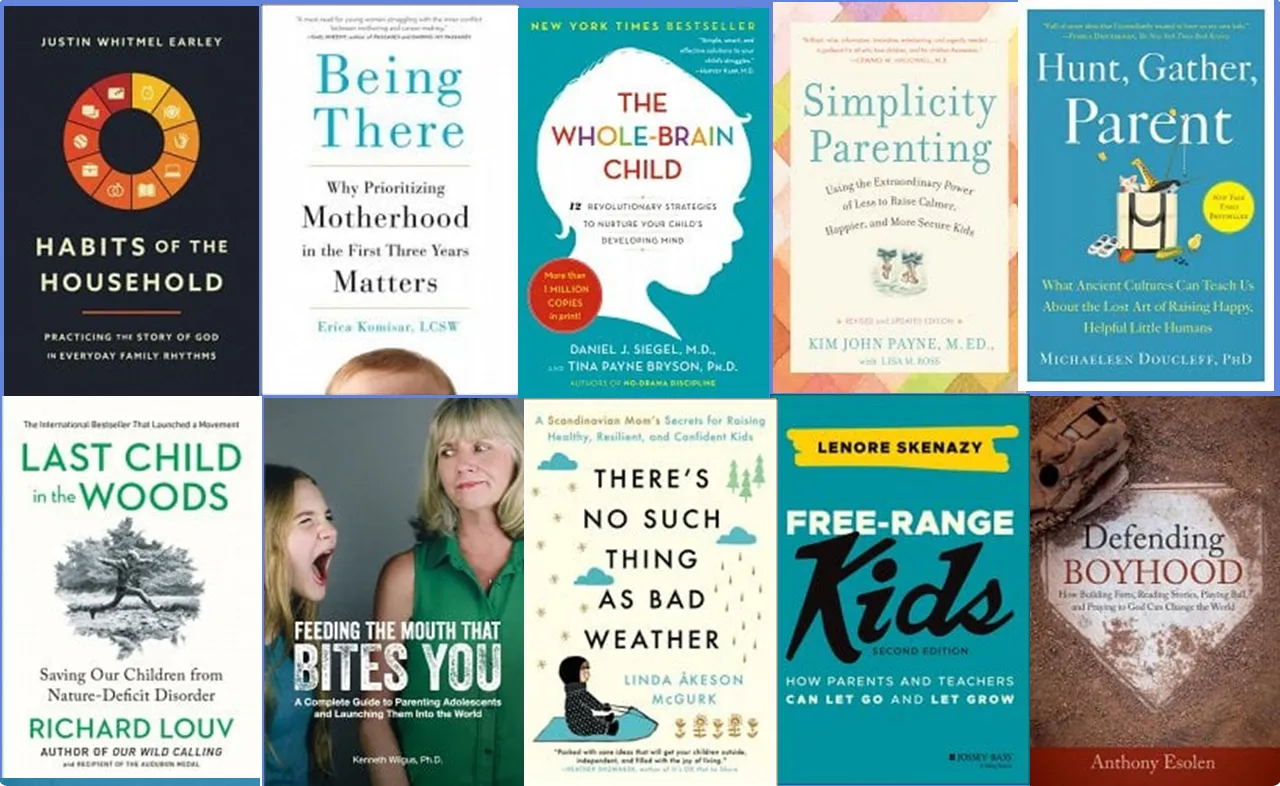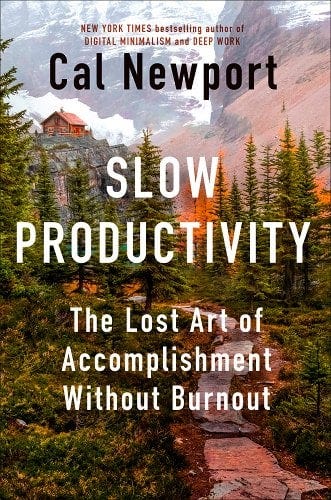Letters From the Unconformed Vol. II
Swimming upstream alone, finding real-life community, and parenting book recommendations
At the beginning of the year,Peco and I asked our readers three questions in relation to devices or any new/emerging technologies:
What is your problem? What is your fear? What is your hope?
We received an outpouring of replies, both in the comments section and via e-mail, and will endeavour to respond to the issues raised in our essays as well as via our new series “Letters From the Unconformed”.
This occasional series will feature more of an informal "kitchen table” tone and include our experiences, guest responses, and occasional interviews. Importantly, the comments section will also allow for an open forum for readers to add their reflections to the questions posed. We hope that this rich cross-fertilization will provide ample considerations that help address the issues of concern to our readers.
My "problem," it could be said, is that I am seemingly part of a very tiny minority in my philosophy of life. Being someone who wants to ask "Why?" at every possible opportunity, to question the norm and ask what might be better for creating the sort of life I actually want to live, I am often the oddball in conversation. As is seemingly true in all situations when it comes to being a minority, a greater effort is needed to create change, simply because the current is not flowing quite in line with where you want to swim.
What is my fear? My fear, kept afloat by a feeling of overwhelm almost like a malaise of the heart, is that my perspective, and my desire for a deep and beautiful life, would remain a minority perspective, and that for all of my effort to the contrary, I would always feel like a stranger in a strange land. That, failing to find commonality in my community, I would always feel alone, however surrounded by people. - J.
Peco:
Thanks, J, for these great reflections. As I read them over, I found myself following different threads of nuance. In many ways you sound like a very intentional person, very conscious and aware, and curious to know how to live better. I have known “oddball” people in the past who also frequently asked “why?” questions in conversations. One of them, an old friend, confided that whenever he asked these questions, his interlocutors looked at him suspiciously, as if he was insinuating something that he wasn’t. Most people are not quite so intentional in how they think and live. They are less like Shakespearean Hamlets, and more like Shakespearean Othellos; less deliberative and more active, so that when deliberative questions get asked, it can feel uncomfortable. I am also a person who has frequently asked “why?” questions in conversations, and at one point it bothered my friends so much (or maybe amused them) that whenever these questions came up, they would declare, “Ah, here’s another Peco question!”
All this is to say that, your feeling like a minority partly might reflect something distinctive in your nature. However, even people who aren’t quite as intentional as yourself can probably connect with the “malaise of the heart” you mentioned; the sense of feeling alone even when surrounded by people. This is a truly more general human experience, I think. The philosopher Jean-Paul Sartre is credited with having said, “If you’re lonely when you’re alone, you’re in bad company”. He was an atheist, which meant he didn’t even have a feeling of God being near him. The Economist magazine calculated that Sartre’s literary output was the equivalent of 20 pages for every day of his working life, which might be a clue as to how he managed his loneliness: perhaps he wrote things that interested him, and thus turned himself into good company rather than “bad company”. I’m only speculating there, but I do think we all need something like this in our lives, a sense of connecting with an activity, a place, something, that is creative and enlivening or deepening, so our aloneness is more like a solitude.
And still that won’t be enough for most. We need each other, or rather “close others”, to varying degrees of closeness. Now we are getting into more complex waters, and my own thoughts in this area are biased based on my own experiences, and should not be taken as something that will work for everybody. Increasingly, we live in a world where relationships operate within fluid boundaries; shorter-term, ambiguously committed, non-sacrificial. If this describes your life, or any of the lives of the people who might be reading this, I don’t mean to be judgemental. We can’t always choose the life we are given, and some people obviously prefer relationship fluidity.
But insofar as we can choose, it seems to me that the bedrock of our relational lives must be built on something richer and more fruitful than transient connections. There are only so many times we can plant and uproot and replant a tree before the tree doesn’t grow properly. By analogy, staying relationally rooted as a human being isn’t always possible, and sometimes the trees around us are difficult and unpleasant, but that’s the way I think were meant to be -- to grow together, in a stable way, each of us separated, yet branches entwined, grouped together in little woods and forests (with a few of us off to the side, not touching others at all). Well, that sounds a bit cliché, but you get the picture.
Many digital technologies isolate us, by pulling us away from real people and into virtual realms, encouraging us to plant and replant our roots again and again, until our relational existence starts to become thin, ghostly, or distorted. Ruth and I written about this before, in various articles (e.g., here, here and here), so I won’t belabour our thoughts any further.
In expressing your hopes, you mentioned your belief in Truth, and Shakespeare’s words: “Truth will out”. That is why, in a digital age fraught with lies and half-lies or just generative AI slush, we can still have genuine hope. Good things last. True things don’t die.
Ruth:
Dear J.,
Let me start off by affirming that although it may feel like you are “part of a very tiny minority”, there are thousands of readers here that resonate with your perspective (a thought which hopefully offers some encouragement). However, while I suspect that the current will not change direction, I do believe that we can grow in strength in swimming upstream.
Living against the stream has been part of our family for as long as we can remember, one example being the counter-cultural educational road we chose. When it was time for our eldest to go to school, we decided to home educate, even though we lived directly across from an elementary school.
It would have been the most natural choice to send our children to school like all the families on our street, indeed like everyone in our neighbourhood. In all of our immediate surroundings, we only knew of one other family who had chosen the road of home education. Our decision naturally prompted many puzzled questions by family and neighbours alike. Why would you make a choice that runs so counter to everyone else? Why not send your kids to school like normal families? Why be so different?
We soon learned a few lessons that helped strengthen our connection with our neighbours and family. While these considerations apply to homeschooling, they easily translate into any given situation, be it tech use or life philosophy, where an individual or family chooses to go against the current:
accept that the stream will not change direction and you will remain part of a very tiny minority
don’t feel the need to explain yourself
don’t expect others to fully understand your choice
have a simple answer ready if people ask about your choice
do not attempt to convert others to your viewpoint
do connect over things that you share in common
develop comfort in being different
trust that your choices will bear fruit over time that will be evident to skeptics
These simple decisions had the overall effect of connecting us with families who had made different educational choices, because they realized that we were not weird in a negative way. We came to know many more neighbours of all ages and backgrounds than the average family, simply because we were open to conversations and friendships. Through patience, persistence, and openness to others, we forged bonds in spite of our differences. Also, while it took time and deliberate effort, we did find many like-minded families over the years.
To bring this back to your question J., while finding like-minded individuals may remain a challenge, having an openness to connect, growing in comfort in making different choices, and actively engaging in practices that others can choose to participate in may open unexpected avenues.
I engage with people and ideas on the internet that I can never seem to drum up locally as much as I would like. I'm creating a cohort of people I've never met, but I'd prefer the cohort to be in person.
Tessa Carman:
One of the gifts of the internet is that we can find out more easily that we’re not alone! But of course we all know the accompanying challenges.
If you’re struggling to find people in person:
1) Definitely keep in touch with people you’ve met online, and try to meet them in person at some point,
2) but also use those connections as scaffolding to find more people near you.
3) Try also slower communication methods with people you meet online. Write some letters. Make some phone calls. This will necessarily pare down the amount of people you can keep up with. But we don’t need to be in touch with a ton of people. We all need one or two really close friends who have our backs, and we all need a good network, a good community, but we don’t need a myriad of “friends”—and after all, we still need time for solitude, and for befriending dead people through their books, and for befriending animals and plants and places.
4) Finally, be very careful of the internet pushing out from your field of vision people who may be right next to you. None of us is randomly placed where we are; we have a duty to our neighbors. Get to know them. You don’t have to be best friends. Just be neighbors. Find the lonely people who would talk with people in person more if they had more friends. Be their friend. Pay attention to what you’ve already been given.
I’ll include some more ideas for finding people in person below.
Almost no one I know seems interested in rejecting the machine. Of all my family and friends, I am the only one who has deleted all my social media accounts, quit drinking, and endeavored to have a slower, more old-fashioned life. One can find good support for these things online, but that makes disconnecting from the machine harder. I don't know how to find local friends.
- O.
Tessa Carman:
We have a fabulous resource for networking right here! Let’s put School of the Unconformed, Pilgrims in the Machine, and the Abbey of Misrule to work. Ask people who are readers of these Substacks (or other newsletters or other online meet-ups where you find kindred spirits) for connection sin your area. Not everyone will be from your area, but those of us who know people—we can introduce folks to other folks. Even if you meet people from your area who you don’t click with, they are still contacts, and can connect you with other folks. Check out a Plough Readers’ meet-up, or a Front Porch gathering.
If you like hosting, host gatherings that could draw interesting people: a folk music jam session, a book discussion on C.S. Lewis’s space trilogy or Andy Crouch’s The Tech-Wise Family or St. Catherine of Siena or St. Seraphim Rose or J.A. Baker’s The Peregrine or the Foxfire books, a repair/mending night, an unplugged nature walk, a wine and poetry night (include a friendly note that it’s paper or memory-only, if you’d like, and you’ll provide the paper!), movie night and discussion.
Go where you sniff a penchant for resistance. If you don’t go to church, try going to church—one that doesn’t have screens in the sanctuary. If you’ve been burned by a particular community, go to a different one—even if it’s a similarly labelled one. Not everyone is the same; labels only so so far; think humanly, not like a machine.
Look at local bulletin boards at coffee shops. If you go to church but haven’t found your people, start a group doing things you’re interested in, and check out what other churches are doing. If you’re Orthodox, be open to meeting Protestants and Catholics. If you’re Catholic, be open to meeting with Amish and Bruderhof. If your kids go to a brick-and-mortar school, be open to meeting a homeschooling family in real life. Check out classical schools and the community around them; the classical education movement is full of people who are interested in sacrificing for and pursuing the true, good, and beautiful. Check out Waldorf schools. Go to farmers’ markets and folk festivals and historical reenactments and talk with people, and watch out for the people that stand out—who aren’t taking pictures with their phones, but who are making things or telling stories. Next time you’re in the area, visit interesting people—maybe folks you’ve heard about through unmachining-type online groups. If you get a bad vibe from someone, you don’t have to go back. Try another place.
If you read an article that you like from an author who seems to be near your neck of the woods, try writing the author to ask for local connections (or write in any case!).
Here are some more places to check out where one might possibly find unmachining folks who could also be your people:
John Cuddeback’s Life-Craft
The Catherine Project
CiRCE Institute
Strong Towns groups
Dr. Angel Adams Parham: Her work is inspiring. See this interview where she discusses the black intellectual tradition, bringing classical education to under-resourced communities, Great Books, and homeschooling.
Visit a farm or ranch, like Saint. John’s Organic in Greater Boise, or Living Pastures in Virginia or Alderspring Ranch in Idaho.
Arts societies: Here are a couple faith-based ones: Rabbit Room in Tennessee; Anselm Society in Colorado.
Visit a monastery.
Subscribe to the Front Porch Republic newsletter and keep an eye out for Porch gatherings (here’s the latest newsletter).
Those are just a few ideas. I could give others depending on folks’ interest and background; others will have more!
Be a mentor, and seek out mentors. If you have teenagers at home, keep an eagle eye out for opportunities for them to gain adult mentors and friends. I can’t tell you how important finding a good mentor during high school was for my husband—and how much I wanted to find some wiser older woman to be my mentor! I was looking to be challenged, not pandered to, and it was easier to find the latter than the former. I think a lot of teenagers are in a similar position. They’re looking for a beautiful vision of life, that will be worth the sacrifices and discipline needed to get there.
Often people are waiting for someone else to say something first, just to get the ball slightly rolling. We might consider, however, whether it's time for us to take courage and take a risk, for the sake of living in true charity.
For this year the biggest hope is to start a family. As we near starting there is a strong nervous excitement, a big step into the unknown. Do you have any books to recommend for new parents? - D.
Ruth:
I have to admit that, apart from the “what-to-expect-type” books, I don’t recall reading much parenting advice. Much of Peco’s and my parenting was informed by our upbringing, education, trust in our faith, and conversations on the couch in the evenings. I thus invited several Substack writers to share their recommendations. The list grew and grew, with many readers adding their favorites. What you find below is an alphabetized list, along with who recommended the book as well as why.
Many thanks to everyone for their thoughtful contributions!
Note: you can find all of the recommended books in our brand-new “Unconformed Bookstore” in the Family and Parenting section here.
You can download a pdf copy of the list here:
Bethke, Jefferson. Take Back Your Family: From the Tyrants of Burnout, Busyness, Individualism, and the Nuclear Ideal
recommended by
“This one was interesting, and provided a helpful reframing for creating a family who is more a team with a shared mission rather than a group of atomized individuals.”
Bowman, Katy. Grow Wild: The Whole-Child, Whole-Family, Nature-Rich Guide to Moving More
recommended by
Bronson, Po and Ashely Merryman. Nurture Shock: New Thinking about Children
recommended by
“I loved Nurture Shock so much, I’m so grateful that I read it when my daughter was tiny - made me rethink a lot of assumptions I had!”
Clarkson, Sally. Own Your Life: Living with Deep Intention, Bold Faith, and Generous Love Top of Form
recommended by
; “ Sally Clarkson’s books have been the only ones that have really resonated with me”; “Sally’s voice and podcast have been amazing…”; “For encouragement for mothers, Sally Clarkson’s Own Your Life is my go-to, as well as several of her other books. Sally hits the balance between duty toward children and the importance of maintaining one’s own self-care and thriving health.”; “I’m just reading Own Your Life and am appreciating much of what I find in there.”;
Clarkson, Sarah and Sally Clarkson. The Lifegiving Home: Creating a Place of Belonging and Becoming
recommended by
, , ; “Sally Clarkson's books are the first that come to mind for me! Especially the Lifegiving Home.”
Cline, Foster and Jim Fay. Parenting with Love and Logic: Teaching Children Responsibility
recommended by
Doucleff, Michaeleen. Hunt, Gather, Parent: What Ancient Cultures Can Teach Us about the Lost Art of Raising Happy, Helpful Little Humans
recommended by
and others
Esolen, Anthony. Defending Boyhood: How Building Forts, Reading Stories, Playing Ball, and Praying to God Can Change the World
recommended by
Faber, Adele and Elaine Mazlish. How to Talk So Kids Will Listen & Listen So Kids Will Talk
recommended by
“I re-read these books at least once a year, whenever I notice myself becoming a shouty, grumpy, bribing sort of parent (which never works but is sometimes so hard to avoid!) and realise I need to get back on track. I wish I carried copies of this book to slip into the handbags/strollers of parents I see out and about having a really tough time!”
Hanscom, Angela J. Balanced and Barefoot: How Unrestricted Outdoor Play Makes For Strong, Competent, and Confident Children
recommended by
Jantz, Gregory L. and Michael Gurian. Raising Boys by Design: What the Bible and Brain Science Reveal About What Your Son Needs to Thrive
recommended by
Kohn, Alfie. Unconditional Parenting: Moving from Rewards and Punishments to Love and Reason
recommended by
Kolber, Aundi. Try Softer: A Fresh Approach to Move Us Out of Anxiety, Stress, and Survival Mode--And Into a Life of Connection and Joy
recommended by
“But honestly? The most helpful books I have read for my parenting are the ones that have helped me to understand my own triggers, anxiety, and trauma.”
Komisar, Erica. Being There: Why Prioritizing Motherhood in the First Three Matters
recommended by
Louv, Richard. Last Child in the Woods: Saving Our Children from Nature-Deficit Disorder
recommended by
, , and others
Mamalakis, Philip. Parenting Toward the Kingdom
McGurk, Linda Åkeson. There's No Such Thing as Bad Weather: A Scandinavian Mom's Secrets for Raising Healthy, Resilient, and Confident Kids (from Friluftsliv to Hygge)
recommended by
, , and others
Neufeld, Gordon and Gabor Maté . Hold on to Your Kids: Why Parents Need to Matter More Than Peers
recommended by
; , “…this is about the importance of being your children’s primary reference point in terms of attachment and moral/emotional orientation, no matter your parenting style, schooling choices, etc. It’s also practical.”
Payne, Kim John and Lisa M. Ross. Simplicity Parenting: Using the Extraordinary Power of Less to Raise Calmer, Happier, and More Secure Kids
recommended by
, , and others
Peterson, Eugene H. Like Dew Your Youth: Growing Up with Your Teenager
recommended by
“so insightful and practical at the same time!”
Rolheiser, Roland. Domestic Monastery
recommended by
and others
Rollins, Cindy. Mere Motherhood Morning Times, Nursery Rhymes, and My Journey toward Sanctification
recommended by
Russell, Helen. The Danish Secret to Happy Kids: How the Viking Way of Raising Children Makes Them Happier, Healthier, and More Independent
recommended by
and written by who adds, “it’s for all those with children aged 0-19 in their lives (as well as anyone who wants to know why people in the Nordics turn out the way they do!)”
Schaeffer, Edith. The Hidden Art of Homemaking
recommended by
Schaeffer, Edith. What Is a Family?
recommended by
Siegel, Daniel J. and Tina Payne Bryson. The Whole-Brain Child: 12 Revolutionary Strategies to Nurture Your Child’s Developing Mind
recommended by
; “I really enjoyed reading The Whole Brain Child - not because I agreed with everything - but because I think understanding what’s going on in small children’s brains and development makes them even more interesting! I have suggested these to a few moms who have found the early years to be “boring”- it’s a lot less boring when you know, for example, what eye contact can do for an infant’s neuro development.”
Skenazy, Lenore. Free-Range Kids: How Parents and Teachers Can Let Go and Let Grow
recommended by
Tripp, Paul David. Parenting: 14 Gospel Principles That Can Radically Change Your Family
Whitmel Early, Justin. Habits of the Household: Practicing the Story of God in Everyday Family Rhythms
recommended by
“it’s my top rec for general principles for understanding spiritual formation, practical ideas, and also lots of grace.”
Whitmel Earley, Justin. The Common Rule: Habits of Purpose for an Age of Distraction
recommended by
Wilgus, Kenneth. Feeding The Mouth That Bites You: A Complete Guide to Parenting Adolescents and Launching Them Into the World
recommended by
, “For the teen years, I highly recommend Feeding the Mouth That Bites You — it was a game-changer for us.
Winckler, Mystie. The Convivial Homeschool: Gospel Encouragement for Keeping Your Sanity While Living and Learning Alongside Your Kids
recommended by
“This one is good for all parents, not just homeschoolers, and it is excellent!”
Wilson, Douglas. Why Children Matter
recommended by
“The book is pithy and an easy read, yet full of fundamental theology and practical wisdom about raising children. This book has given me a handful of parenting paradigm shifts around discipline, responsibility, family worship etc..It can be read in a couple of hours, and has become a yearly read for me and my wife.”
Also, Cal Newport’s new book Slow Productivity: The Lost Art of Accomplishment Without Burnout is out today! As I greatly appreciated his insights in Digital Minimalism, I am looking forward to digging into this one. It is on sale at our Unformed Bookstore (which also supports independent booksellers) here :)
We hope that these responses to “Letters From the Unconformed” offered some hopeful considerations that begin to address these thoughtful questions, and would like to invite readers to offer their perspectives as well.
What do you think?
What considerations would you add?
Please join the open forum in the comment section!
If you found this post helpful (or hopeful), and if you would like to support our work of putting together a book on “The Making of UnMachine Minds”, please consider supporting our work by becoming a paid subscriber, or simply show your appreciation with a like, restack, or share.














Lots of wisdom and great advice here! I would add that praying for good friends and like-minded folk has been invaluable for me over the years: God has never failed to provide, and often they have been people I wouldn't have "naturally" connected with.
On a practical level, I would also add that it might be worth moving to be near a community that shares, at least somewhat, your vision for what a good life looks like. I know it's not possible for everyone, but I think culturally we tend to think of "jobs" or "cost of living" as acceptable reasons for moving, but rarely do we consider "community" (whether that be family, church, school, friends, or other forms) a "good enough" reason to move. And yet, often that is the thing that brings the most meaning and purpose to our lives! Often, we're willing to sacrifice connection and community for a career, but we aren't willing to do the reverse. Why not? I think it's worth discerning for everyone.
J: Philosophy is a 3000 year long conversation attempting to answer the exact questions you're asking. I teach phil, poli-sci and econ at the HS level. I would suggest Hillsdale College's free Intro to Western Phil -- https://online.hillsdale.edu/courses/introduction-to-western-philosophy It's completely free, assumes no existing knowledge, and gives a great overview from Plato to postmodernism in a dozen lectures and reading excerpts. In addition, in-between Descartes and Hume, I would add this video on Pascal -- https://www.youtube.com/watch?v=sd2E88jkNIA -- and these readings -- https://www.web.stanford.edu/~jsabol/certainty/readings/PascalPensees.pdf . These are the exact videos and readings I use with my students.
You're a minority, but not in the way you think. The vast majority of people are searching for meaning and transcendence and telos... most of them just don't realize it. Even a thinker as great as David Hume got distracted by shiny objects. You're the minority that doesn't get distracted. That's powerful. Use it.